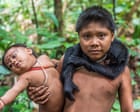
In a world teeming with diverse narratives and complex challenges, several recent stories highlight important events and issues around the globe, from the Amazon rainforest to New Zealand, and from El Salvador to the United Kingdom and Australia. These unfolding stories provide us with a valuable opportunity to understand and reflect on different aspects of our shared journey as global citizens.
The lush expanses of the Amazon rainforest have been under scrutiny as reports emerge about missionaries using solar-powered audio devices to evangelize isolated Indigenous peoples, like the Korubo tribe. These devices, which play biblical messages in Portuguese and Spanish, were found in the Javari Valley, sparking concerns over breaches of Brazil’s protective laws for Indigenous communities. Despite strict regulations aimed at safeguarding these groups, drones have also reportedly been seen in these territories, highlighting a significant challenge in balancing cultural preservation and the right to religious expression.
Meanwhile, in Central America, harrowing tales have emerged from Venezuelans who were sent by the Trump administration to endure imprisonment in El Salvador’s mega-prison. Descriptions of their experiences paint a grim picture of alleged “state-sanctioned torture,” including isolation and inadequate living conditions. Individuals like José Manuel Ramos Bastidas, who returned to Venezuela, have narrated their traumatic experiences, emphasizing the delicate nature of international detention agreements and human rights commitments.
On another continent, in New Zealand, a poignant debate surrounding electoral reforms has surfaced. The country’s attorney general has aired concerns about potential breaches of human rights law, and the possible disenfranchisement of Māori voters, in response to proposed changes such as the closure of voter enrollment days before elections and restrictions on prisoner voting. Prime Minister Christopher Luxon has defended these changes, stating they are necessary updates to the electoral system; however, the discussion underscores the constant balancing act between legislative reforms and human rights protections.
In Australia, discussions on international relations took center stage at the Victorian Labor Party’s conference. Members called for immediate recognition of a Palestinian state, juxtaposing Prime Minister Anthony Albanese’s stance that such a move requires further steps toward a two-state solution. This proactive push reflects the passionate debate within Australia regarding global geopolitics and the nation’s role in fostering peace and recognition on the international stage.
Across the seas in the United Kingdom, there is a rising discourse on labor rights, particularly concerning zero-hours contracts. Conservative and Liberal Democrat peers have faced criticism from groups like the Trades Union Congress for allegedly hindering progress towards stronger worker protections. This unfolding narrative involves a deeper introspection into the labor market’s dynamics and the struggle to enhance rights for those in precarious employment situations.
These stories, spanning continents and cultures, envelop us in a thoughtful reflection on the multifaceted nature of human rights, legislative actions, and international advocacy. As we stay informed and engaged, it is essential to approach these narratives with open minds and a shared commitment to a harmonious global community. Through understanding and empathy, we can continue to address these challenges with a sense of purpose and mindfulness.
Source: {link}
